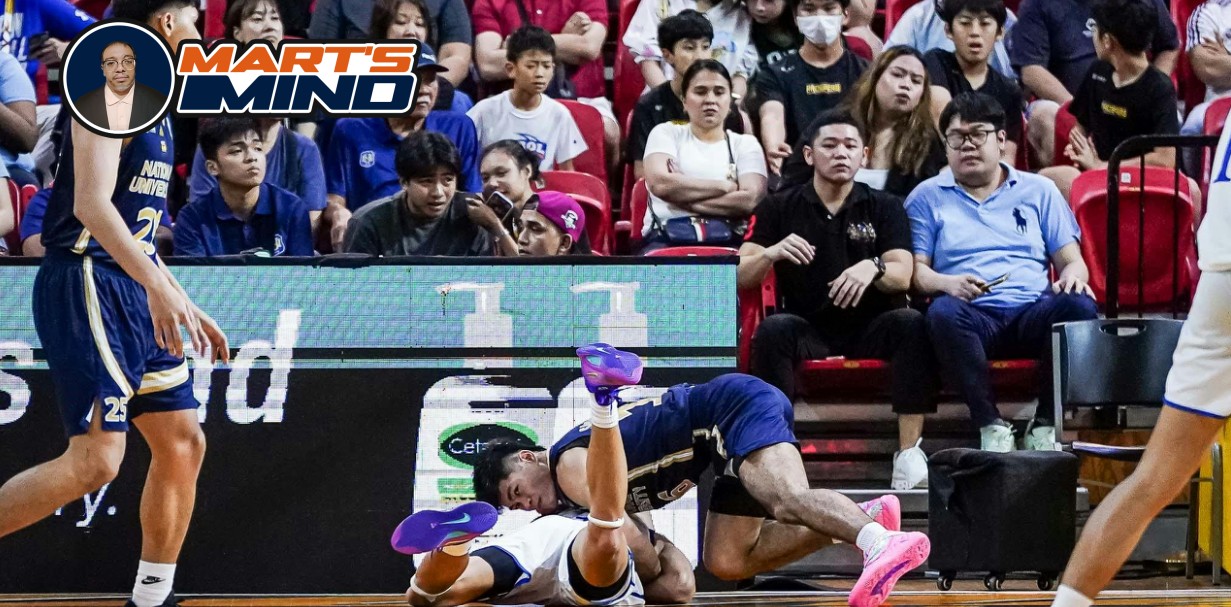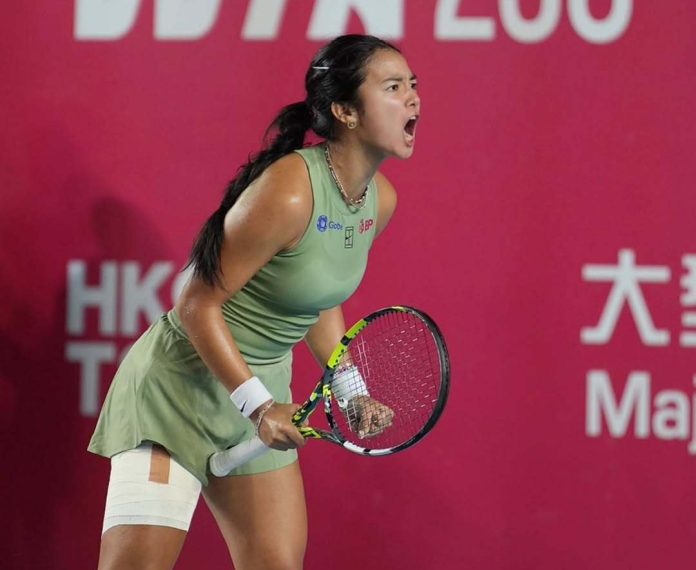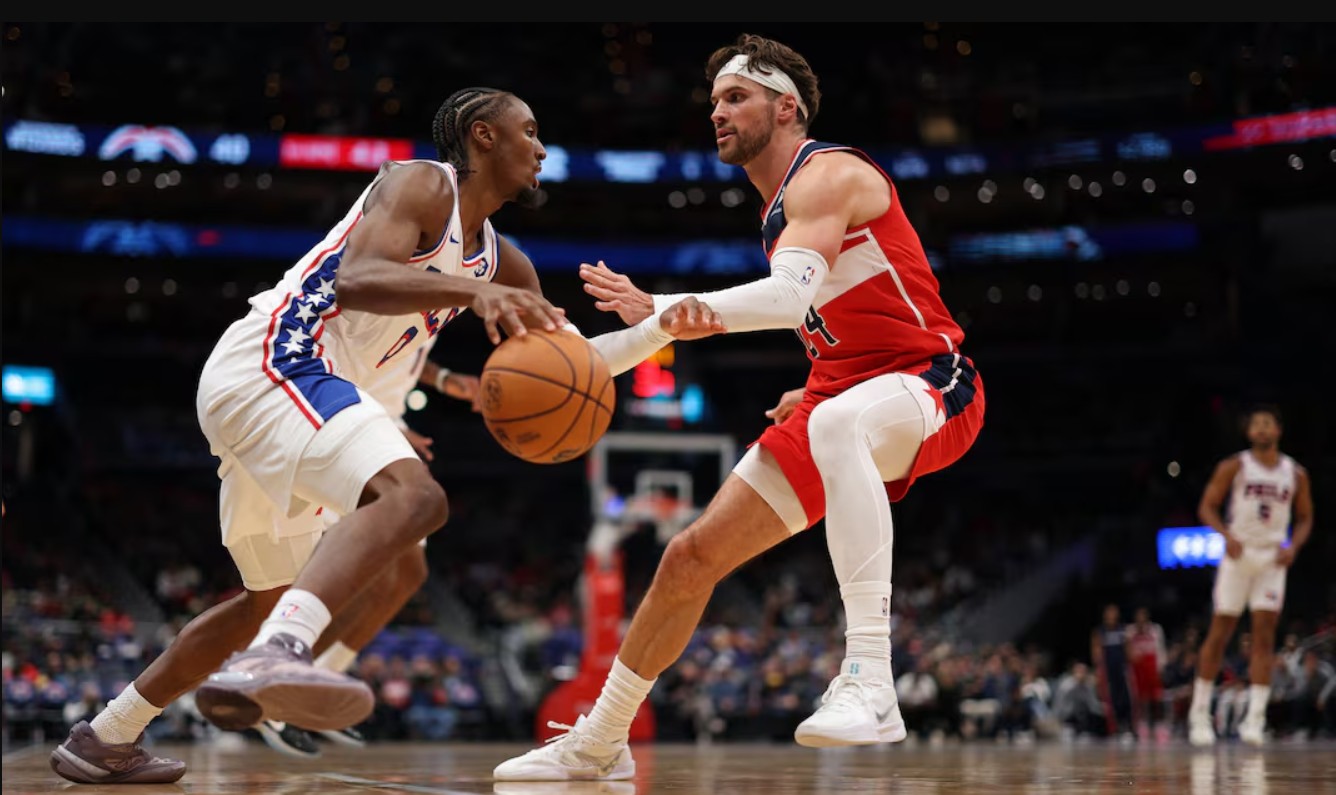(Editor’s Note: Mart’s Mind is a dedicated space for Rebanse’s lead sports journalist, Martin Dale D. Bolima, where he shares his unfiltered thoughts on anything sports. It could be a commentary of an issue, a deeper analysis of a game, a random musing about something, or whatever he deems worth sharing. His thoughts don’t necessarily represent those of Rebanse, but they’re certainly meant to open up discussions and inspire dialogue. This is Martin’s first commentary.)
—————————————————————————————————————————————————
Let’s not sugarcoat it—what the NU Bulldogs’ Gelo Santiago did to the Ateneo Blue Eagles’ Waki Espina was dirty, dangerous, and disgraceful.
There’s no other way to describe an intentional elbow to the back of the head of a defenseless player. It’s not the kind of act one can brush off as a “heat-of-the-moment” thing (something Santiago claims in his supposed apology after the fact). Neither was it a mere lapse in judgment. It was a deliberate act of violence. It was an assault, and it’s one that has no place on a basketball court, much less in a collegiate league supposedly built on sportsmanship and integrity.
For that dastardly act, Gelo Santiago will miss the rest of the eliminations of Season 88 but play in the Final Four, assuming the Bulldogs make it there. With a 7-2 record through nine games, a stout defense, and a decent-enough offense, it’s highly likely NU ends up as one of the top four teams in the tournament, which means Santiago will probably play again this season—even after that cowardly and intentional elbow to the back of Espina’s head.
Five games.
That’s all the time Gelo Santiago will miss for direct assault. Jai Reyes, the commissioner of the UAAP this season, really thinks that’s enough of a punishment for what was clearly an act of hooliganism.
But let’s not sugarcoat this either: A five-game suspension isn’t enough in this case.
Why Gelo Santiago Missing Five Games Isn’t Enough
The reason the punishment doesn’t fit the crime here is because of the gravity of the act. Basketball is a contact sport, yes, but it is not a combat sport. There’s a fine line between hard play and outright violence, and Gelo Santiago didn’t just cross it—he obliterated it. And in doing so, he could’ve caused serious injury to Waki Espina. The back of the head is one of the most vulnerable areas of the human body, where even moderate impact can sometimes lead to brain trauma. Espina appears to have avoided anything serious, which is a good thing, but it could’ve been most certainly worse.
Complicating matters are Santiago’s past acts. Once, against the UP Fighting Maroons, he appeared to undercut Terrence Fortea on a fastbreak lay-up. Fortea managed to hold on to Santiago to brace his fall, but he could’ve had a scarier, more dangerous fall. Another time, he appears to purposely lunge at the legs of La Salle Green Archer Mason Amos, injuring him in the process and cutting short his own season for the Taft-based squad. In other words, Santiago is a repeat offender, with his unsportsmanlike acts getting more and more dangerous, ultimately culminating into outright hooliganism on Espina.
And yet, the UAAP and Reyes thought a five-game suspension was enough. Reyes had previously suspended UE Red Warrior Wello Lingolingo for three games for a reckless dive in a loose-ball situation that injured La Salle Green Archer Kean Baclaan. That Baclaan unfortunately got seriously injured and Espina didn’t shouldn’t matter. One was a basketball play, albeit done recklessly, while the other was downright an act of violence. It seems Reyes, a former player himself, conflated recklessness with malicious intent, and that means Gelo Santiago will get away with a slap on the wrist.
For comparison, the MPBL brought the hammer down on Michole Sorela and Arwind Santos, with Commissioner Kenneth Duremdes handing out a lifetime ban on the former for hitting Jonas Tibayan and an indefinite suspension on the latter for a closed fist on Tonton Bringas just recently.
That the MPBL is a pro league shouldn’t matter. Hooliganism is hooliganism no matter the level. Sucker punching someone is an act of a thug, and so is elbowing a fellow player lying face down with no ability to defend himself. Both should be punished severely—and perhaps even more so in a collegiate league where players are also students, role models, and ambassadors of their schools. Actually, in this case, the standard should be higher, not lower, because the UAAP is supposed to be molding boys into men.
So, in going easy on Gelo Santiago, Reyes and the UAAP have effectively sent a wrong message to their players: A cheap shot will earn you a few games on the sidelines and then a clean slate. By doing so, the league and its overseers have gravely failed in their role as a guardian of both competition and character.
A Missed Opportunity for the UAAP
This was the perfect moment for the UAAP to draw a firm line in the sand and say: We do not tolerate violence in any form. Instead, the league blinked. It chose leniency over principle. It opted for manageable discipline over meaningful accountability.
This leniency, unfortunately, doesn’t just affect one player or one school. It affects the culture of the entire league. It sends a message, no matter how vaguely, that aggression or even hooliganism pays off and that there’s wiggle room for violence. This is exactly how bad habits start and how reputations rot from within. Collegiate sports should be about growth, accountability, and discipline—even if that means doling out harsh punishments.
That being said, what is the right punishment in this case?
At the very least, Gelo Santiago should miss more than five games. The suspension should last the entire season, spanning NU’s final five games in the eliminations and all of their Final Four games if the Bulldogs make it there. He should be forced to watch on the sidelines as the Bulldogs embark on what could be a potential championship run given the way they have been playing.
But if the UAAP is truly about preserving the idea that student-athletes (notice how student comes first before athlete) must embody the values of education, respect, and sportsmanship, then revoking one full year of eligibility should have been the baseline. It would have sent a crystal-clear message: There is no place for violence in the UAAP. It would have told fans, coaches, and players that the league values integrity above all else. Instead, we got compromise disguised as discipline.
The Bottom Line
The UAAP’s five-game suspension of Gelo Santiago isn’t justice—it’s damage control. It’s an attempt to move past the controversy without actually confronting it. But let’s call it what it is: a failure of leadership.
By choosing leniency, the league has weakened its moral authority and undermined the safety of its athletes. It has told everyone watching that you can throw an elbow at someone’s head and still come back for a possible championship run.
That’s not the kind of league the UAAP should aspire to be.







